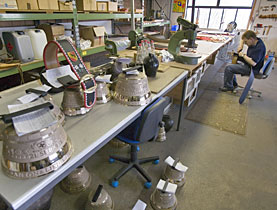Small businesses weathering the economic storm

Family-run firms in Switzerland are well set to survive the global recession having put long-term growth before quick profits in the good years, a report concludes.
Such small- and medium-sized enterprises (SMEs), which account for more than 88 per cent of all Swiss companies, are also cushioned by an aversion to taking on too much debt but still face succession problems.
The survey of 300 Swiss family-owned SMEs found that 68 per cent of companies are less motivated by making money than in maintaining the good name of the firm.
Some 83 per cent of owners put the healthy state of their company down to risk aversion and 39 per cent said long-term planning was crucial to success.
Swiss family business consultant Hakan Hillerström contributed to the study by Barclays Wealth and the Economist Intelligence Unit.
“Often, without a stock market listing, family businesses are insulated from the need to meet the short-term demands of investors and so are better placed to ride out volatility than their listed peers,” he said.
Succession challenges
The report concludes that many small, family-owned ventures are better insulated from the global recession than their larger counterparts because they are run as assets to be passed down to future generations rather than as wealth machines.
“This report shows that family businesses are well placed to survive and even thrive in the economic downturn,” said Philippe Sednaoui, managing director and CEO of Barclays Wealth in Switzerland.
However, the report came with a health warning about the challenges of succession that sometimes burst the bubble of a company’s fortunes if handled badly.
A separate survey by the Centre for Family Business at St Gallen University also pointed to the particular risk facing such enterprises. Succession issues will affect one in four firms in the next five years, but only half of owners surveyed had a clear strategy in place.
The report found a dramatic reduction in the number of companies being handed over to members of the same family. Four years ago, 60 per cent of handovers stayed in the family compared to 40 per cent now.
Professor Thierry Volery of the university said there were warning signs that some owners were too attached to their firms to let go or did not see eye-to-eye with potential successors within their families.
Strong position
Volery was also more concerned about the growing problems presented by the economic downturn for the many Swiss SMEs that trade heavily abroad.
“Some of the darlings of the Swiss business sector, which displayed tremendous growth in the last few years, have been hit very badly in the last quarter because up to 70 per cent of their sales are taken by international markets,” he told swissinfo.
The picture is less gloomy for domestic-facing firms, according to Volery who nevertheless believes that most companies, irrespective of their international exposure, should be able to withstand the pressure.
“Family-owned SMEs are in a strong position to face the crisis because they are self-financed through earnings rather than debt. This should act as a buffer as banks will be willing to lend to companies with such a low risk profile,” he said.
swissinfo, Matthew Allen
Small- and medium-sized enterprises (SMEs) are those that employ up to 250 people, but 87.9% of SMEs have fewer than 10 employees.
Family-owned firms make up some 88% of all companies in Switzerland.
They account for 99.7% of the 307,000 companies in the Swiss private sector and provide jobs for 66.8% of the workforce.
The St Gallen University study showed that 26% of family-owned companies in Switzerland would have a change of owner in the next five years. In January 2005, this figure stood at 18.5%.
Only 40% of firms are handed over within the same family, compared to 60% four years ago. Around half of the remaining firms will be passed on outside of the family while succession relating to the remaining half is still unclear.

In compliance with the JTI standards
More: SWI swissinfo.ch certified by the Journalism Trust Initiative











You can find an overview of ongoing debates with our journalists here . Please join us!
If you want to start a conversation about a topic raised in this article or want to report factual errors, email us at english@swissinfo.ch.